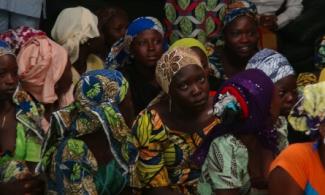
Governor Kashim Shettima of Borno has assigned an inter-faith, and civil society group, and given them the mandate to search and chose schools for the 57 rescued Chibok schoolgirls.
Governor Kashim Shettima of Borno has assigned an inter-faith, and civil society group, and given them the mandate to search and chose schools for the 57 rescued Chibok schoolgirls.
googletag.cmd.push(function() { googletag.display('content1'); });
Shettima told members of the Kaduna-based ‘Inter-Faith Mediation Centre,’ who were in Maiduguri Tuesday with some medical experts, to commence with the counseling of the 57 freed Chibok girls. He also gave the group the ‘green light’ to search for good schools for the rescued girls in Abuja, or other areas. Shettima said his administration was “determined to do everything within its power” to give quality education to the traumatized girls.
He noted that the state government has earmarked N100 million for the education of the Chibok schoolgirls, adding that, “we are willing to do everything within our reach to give them (a quality education,) including those still held captive. We are willing to relocate all of them to bring them out of their trauma," the governor said with tears welling up in his eyes.
He said he decided to assign the center the responsibility of choosing schools for the girls since it will be engaged in the counseling exercise, after which, it would identify the capacities to make an informed decision appropriately to the future of the girls. The governor expressed hope that the schoolgirls would come out of their traumatic experience, grounded, at the end of the exercise.
googletag.cmd.push(function() { googletag.display('content2'); });
Leaders of the Inter-Faith Mediation Centre, including Pastor James Wuye, and Imam Mohammed Ashafa, disclosed that the center was established in the aftermath of a sectarian crisis in the north central Kaduna State some years back. The Imam said the center is backed by the United States Agency for International Development, also known as USAID.
They commended the state government for constituting a counseling team made-up of medical experts, including psychology experts for the schoolgirls, even before the voluntary intervention of the mediation center. "We are here not to reinvent what has been done. We have been to other African nations, like Chad, the Central Africa Republic, the Sudan, among others, but we have the urge to replicate the same in our country. Ours is a Psycho- therapy approach, we are to generate data, and then follow up the girls’ progress in their education. The medical personnel will also assist (us) in some medical checks, in collaboration with the local doctors. We are here to complement your efforts," Wuye and Ashafa stated before the governor.
Chief of Staff to the Governor, Alhaji Abu Kyari, later explained that the Chibok schoolgirls are divided into three categories, namely the 57 escapees, 119 not abducted but who ran away from the school when the abductors came, and the approximately 219 still being held.
The exact number of the missing students remains a source of debate. There continues to be varying numbers appearing in several media publications. Just how many students remain among the missing, and still in the hands of Boko Haram is not clear. Government officials, however, speculate that more than two hundred were kidnapped from the Chibok School in mid-April, but only fifty-seven escaped, and are now free from their abductors.
googletag.cmd.push(function() { googletag.display('comments'); });